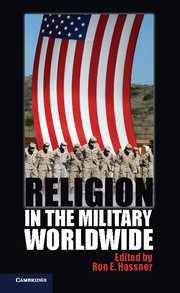Book contents
- Frontmatter
- Contents
- List of contributors
- Introduction
- Part I Rituals, Beliefs, and Practices
- Part II Religious Demographics in the Armed Forces
- Part III Religion and Military Operations
- Part IV Constitutional Challenges
- 8 United States I
- 9 United States II
- 10 Turkey
- Conclusion
- Contributor Biographies
- Index
- References
8 - United States I
Published online by Cambridge University Press: 05 June 2014
- Frontmatter
- Contents
- List of contributors
- Introduction
- Part I Rituals, Beliefs, and Practices
- Part II Religious Demographics in the Armed Forces
- Part III Religion and Military Operations
- Part IV Constitutional Challenges
- 8 United States I
- 9 United States II
- 10 Turkey
- Conclusion
- Contributor Biographies
- Index
- References
Summary
No religious Test shall ever be required as a Qualification to any Office or public Trust under the United States.
(U.S. Constitution, Article 5)Congress shall make no law respecting an establishment of religion, or prohibiting the free exercise thereof.
(U.S. Constitution, First Amendment)This chapter begins with a short note about the author’s context and approach to the topic. Unlike the social-scientific approach of many of my colleagues’ chapters in this volume, I write from the perspective of a military ethicist who has had the privilege of working closely with U.S. military officers at the United States Air Force Academy, the Army War College, and now the Naval War College. The perspective I bring to bear on the role of religion in the military is more normative than descriptive. Because the foundation of professional military ethics in the United States is the oath each member takes to the Constitution of the United States, the question of the proper role of religious belief, practice, proselytizing, and so on, is necessarily framed in terms of how individuals understand constitutional guidance on such matters and, more important, how they ought to understand that guidance.
As the following discussion shows, these questions of constitutional understanding are by no means fixed and clear. Indeed, they are highly controversial topics among military members in the United States and in U.S. society and government itself. To some degree, this is inevitable, because the tension between the two guarantees of the First Amendment of the U.S. Constitution, the right to free exercise of one’s own religion and the restriction on the federal government’s endorsement of any particular religious belief or practice, virtually enshrines struggle about religion into the foundation of the U.S. government. This chapter explores these tensions as they have played out in the experience and practice of the U.S. military in recent years. Because the author’s professional location entails leading officers to explore and understand the proper normative behavioral standard that should guide their professional behavior in these areas of religious practice, this chapter necessarily reflects that quest for normative clarity and the importance of correcting faulty understandings and behaviors in the U.S. military.
- Type
- Chapter
- Information
- Religion in the Military Worldwide , pp. 181 - 195Publisher: Cambridge University PressPrint publication year: 2013
References
- 2
- Cited by

